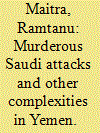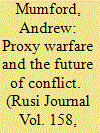| Srl | Item |
| 1 |
ID:
084307


|
|
|
|
|
| Publication |
2008.
|
| Summary/Abstract |
The requirement of legitimate authority, though central to medieval and modern interpretations of the just war tradition, has received less attention in the contemporary literature than the other requirements of jus ad bellum. The usual interpretation holds that the kind of entities that have legitimate authority are states, coalitions of states, supranational institutions or national liberation movements and that these political entities are endowed with the authority to wage war. At the same time, contemporary literature on the ethics of international relations is characterized by a revival of the cosmopolitan tradition. This subjects states and quasi-states to stringent legitimacy conditions: according to cosmopolitans, states are internally legitimate-have the right to coerce their own members-if, and only if, they respect the latter's fundamental human rights. The principle of legitimate authority has been criticized in some recent writings on war for not taking account of the implications of (independently defended) cosmopolitan descriptions of state legitimacy. If states are subject to stringent legitimacy conditions such as those outlined above, the criticism goes, they do not possess the right to wage war simply by virtue of their being a state. Rather, the authority to resort to war should be vested in supra-national institutions as well as, or indeed, rather than, states. In this sense war becomes a mechanism for enforcing cosmopolitan moral norms, as opposed to a mechanism for resolving interstate disputes. This cosmopolitan account of legitimate authority needs to be developed to include supra-national institutions. While the author does not deny that such institutions have the moral and legal right to wage war, the aim of this article is to cast doubt on the cogency of the requirement of legitimate authority itself-on cosmopolitan grounds. From a cosmopolitan point of view, the article argues there are very good reasons for dropping the requirement altogether. After sketching out a plausible cosmopolitan account of justice in section two, section three shows that a war need not be waged by a legitimate authority in order to qualify as a just war.
|
|
|
|
|
|
|
|
|
|
|
|
|
|
|
|
| 2 |
ID:
140424


|
|
|
| 3 |
ID:
122242


|
|
|
|
|
| Publication |
2013.
|
| Summary/Abstract |
The contemporary dynamics of proxy warfare will make it a significant feature of the character of conflict in the future. Andrew Mumford identifies four major changes in the nature of modern warfare and argues that they point to a potential increase in the engagement of proxy strategies by states: the decreased public and political appetite in the West for large-scale counter-insurgency 'quagmires' against a backdrop of a global recession; the rise in prominence and importance of Private Military Companies (PMCs) to contemporary war-fighting; the increasing use of cyberspace as a platform from which to indirectly wage war; and the ascent of China as a superpower.
|
|
|
|
|
|
|
|
|
|
|
|
|
|
|
|